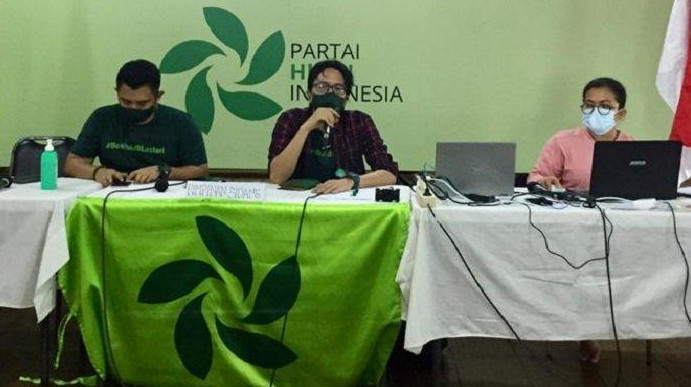Popular Reads
Top Results
Can't find what you're looking for?
View all search resultsPopular Reads
Top Results
Can't find what you're looking for?
View all search resultsGreen Party seeks authorization for 2024 election run
The party hopes to bring environmental issues to the forefront of Indonesia’s political discourse.
Change text size
Gift Premium Articles
to Anyone
A
ctivists are seeking to establish an electorally viable political party to bring environmental issues to the forefront of Indonesian politics, a strategy that has been attempted before in the country.
Members of Green Party Indonesia (PHI) declared their intention to register to run in the 2024 elections at the party’s first national congress in late February of this year. The party’s co-president, John Muhammad, said Indonesia urgently needed a green party as severe environmental issues threatened the country and its people.
A central component of the party’s platform is ensuring the significant reduction of greenhouse gas emissions, as proposed in the 2018 Intergovernmental Panel on Climate Change (IPCC) report. The panel urged all nations to work to prevent global temperatures from rising more than 1.5 degrees Celsius by 2030. Otherwise, the report noted, the climate crisis would trigger deadly catastrophes.
Despite this urgency, Indonesia passed the Job Creation Law last year, which, John noted, encouraged the use of fossil fuels and other dirty energy sources that exacerbated the climate crisis.
Other prevailing policies, including the country’s plan to be carbon neutral by 2070, would not be enough to mitigate the crisis, he said.
“Our choices are limited. Like it or not, we will need a green party [to influence political decisions],” John added.
Read also: Environmental issues still low on agenda as pragmatism prevails: Experts
The idea of establishing an electorally viable green party in Indonesia has been around since the beginning of the Reform Era in 1998, when citizens were allowed to form new political parties after the fall of Soeharto’s New Order regime.
Lecturers Widyatmoko of Trisakti University and Ignatius Heruwasto of the University of Indonesia declared the formation of a green party in October 1998. However, the party failed to fulfill the requirements to participate in the 1999 general elections.
The plan to establish a green party was revisited in 2012 by environmentalists in Bandung, West Java. But the plan did not gain traction until the national congress in late February of this year.
According to the 2008 Political Parties Law, a party must register with the government and have at least 50 adults of Indonesian nationality as members, 30 percent of whom must be women.
The party must also have local representatives in each province and in at least 75 percent of the country’s regencies and cities.
A 2019 government regulation on non-tax state revenue requires new political parties to pay a Rp 100 million (US$6,927) registration fee.
Read also: Environmental concerns, protests may discourage foreign investment: Moody’s
John said the party aimed to finish its registration with the government by April while continuing to recruit members. According to the party’s website, hijau.org, at least 1,200 people have registered across 34 provinces.
Indonesian Institute of Sciences (LIPI) political analyst Yogi Setya Permana said the existence of a green party in Indonesia was long overdue, as mature democracies tended to have at least one party campaigning on environmental issues.
“There has not been a single party that accommodates such issues from any [part of the] spectrum, be it right- or left-wing, religious or nationalist,” Yogi said.
But even if it is approved for electoral participation, the party will have to overcome obstacles before making an impression on the country’s political landscape, Yogi added. The first hurdle was covering the financial costs of running the party. Another would be finding ways to win votes, which would be a feat as surveys showed that Indonesians tended to be uninformed on environmental issues.
A survey by the Centre for Strategic and International Studies (CSIS) that involved nearly 2,000 potential voters in the 2019 elections found that only 1.6 percent thought environmental issues were the most pressing issues they faced.
“Environmental issues may remain marginal as voters don’t yet understand the significance of politics in the environment,” he said, adding that such issues were often reduced to simple public relations campaigns.










